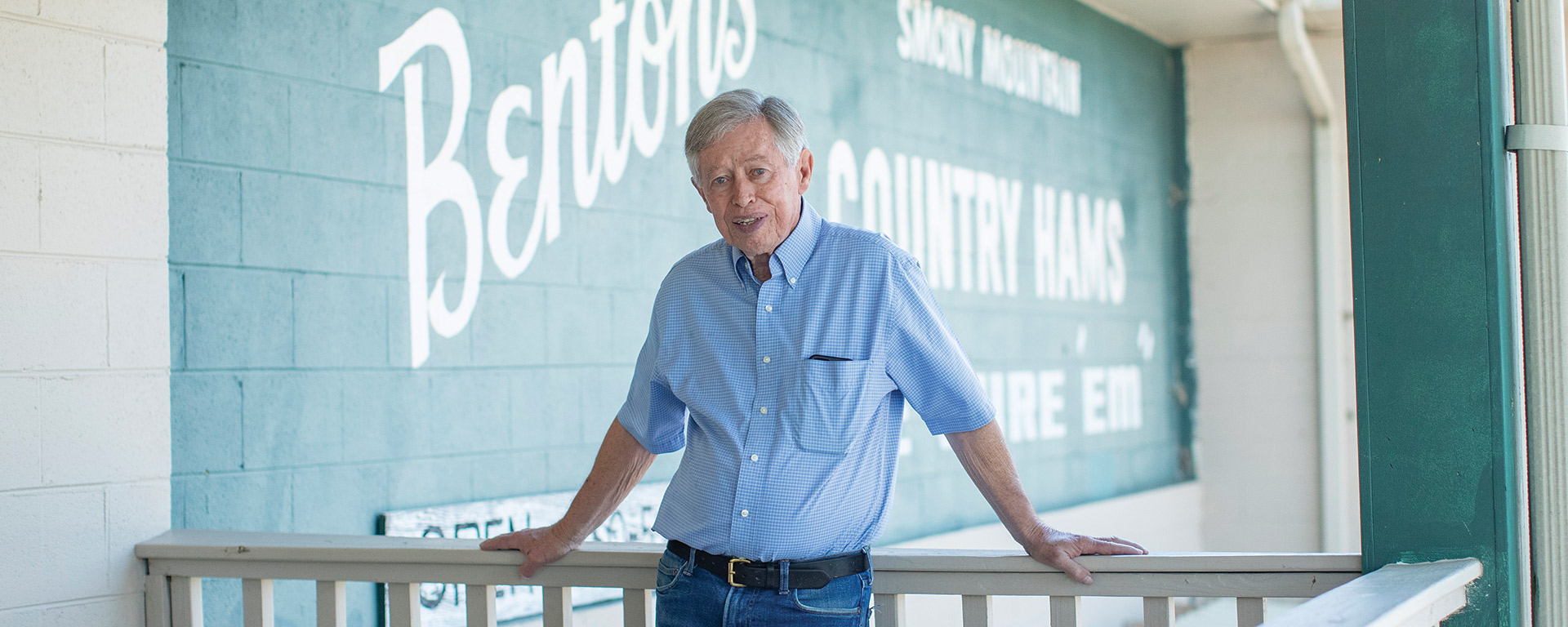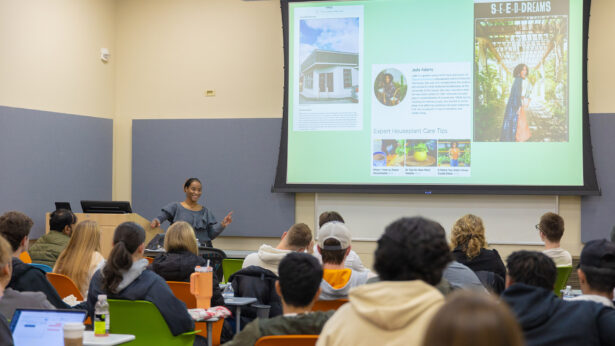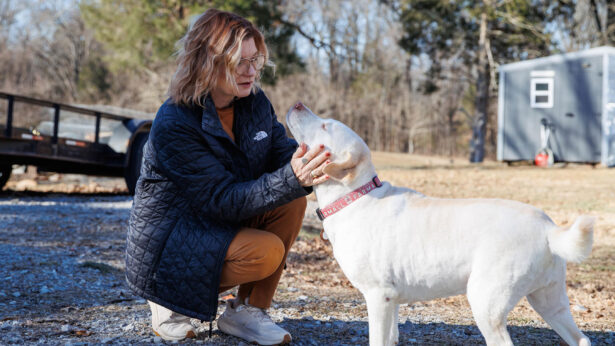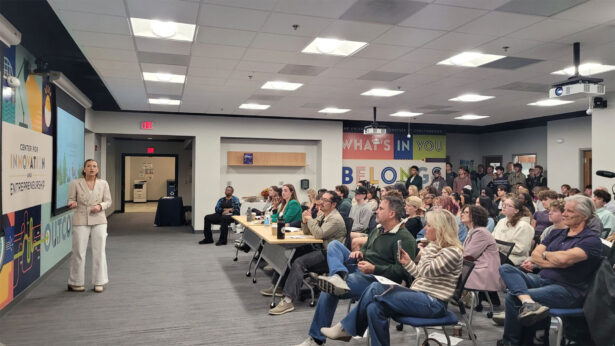“From the first day I started, I wanted to make something truly extraordinary. That was my goal.” – Allan Benton
In the Fall of 1973, Allan Benton—a 1969 graduate of the UT Knoxville College of Education—quit his job as a high school guidance counselor to start curing, smoking and aging hams in a leased building in Madisonville, Tennessee.
“I wrote universities all over the country trying to learn more about what I was going to do,” says Benton. “I soon realized that 45 minutes up the road I had all the expertise I needed.”
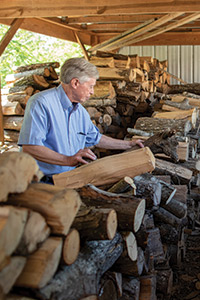
Allan Benton checks the supply of hickory wood, which he uses to smoke bacon and hams.
UT Institute of Agriculture Food Science and Technology Professors Sam Winfrey and Curtis Melton received Benton’s letter and reached out.
“They came to visit me,” says Benton, helping with pesky problems like spoilage. “They calculated exactly how much cure I needed to use on my meat. For three or four months, I was there every two or three weeks. I was soaking up everything I could learn. Every time I’d hit a rough spot, those guys would hold my hand and walk me across it. They were super. What I owe the University of Tennessee, I could never repay if I tried.”
Today Benton and his 21 employees at Benton’s Smoky Mountain Country Hams on U.S. 411 in Madisonville cure and age some 18,000 hams and 50,000 bacon bellies a year. On a recent week day, employees expertly cut hams in view of a steady stream of customers stopping by the shop to pick up bacon, sliced ham and more. In the back, other employees moved wooden tiers of hams out of the smoker where they spent three days infusing in hickory smoke before moving the next lot into it. Another employee placed packages and envelopes of ham and bacon waiting to be mailed on a bench.
They ship to so many five-star restaurants and chefs that Benton doesn’t like to list them, for fear of leaving someone out, and he is grateful to them all because the rise of Benton’s bacon has come from word of mouth among superstar chefs like David Chang.
“I am so blessed. I sell to 500 different chefs because I sell to David,” says Benton. “He is so hot right now. He has restaurants all over the world, but I think majordomo in Los Angeles is his best endeavor yet.”
Benton’s rise—like his process of aging hams—took time.
“Going back 20, 25 years,” he remembers, “I laid awake many nights with a lump in my chest, wondering if I was going to make it.”
But the unique taste of his products has never been an accident.
“From the first day I started,” he says, “I wanted to make something truly extraordinary. That was my goal. Even today our goal is to create a world-class product. With our employees, we want people who will take pride in making something really special.”
And he has remained true to the time-tested family cure of salt, brown sugar, and black and red pepper—a methodology passed down through the generations.
A Family Tradition of Pork
Benton was raised in the southwest corner of Virginia, in Scott County, just over the state line from Kingsport.
“I’m just an ol’ hillbilly,” Benton likes to say. “I was born so far back up in the hills you had to look straight up to see daylight. We got our water from the
springhouse. We had outdoor toilets. It was just a subsistence living. We raised everything we ate. Neither side of my family owned a car, truck or tractor. They farmed with horses and mules, and they raised everything they ate.
“For my grandparents, pork was sustenance. Being enterprising Appalachians, in August of each year, they turned their hogs loose to run in the hills and find acorns. This produced extremely fine-quality pork. Thanksgiving was the traditional day for butchering pork in the mountains. We’d spend three days doing it, working with the whole hog.”
The Schoolhouse to the Smokehouse
After graduating from UT in 1969 with a degree in education, Benton worked as a guidance counselor at Monroe County’s Vonore High School.
“I got to work with an incredible bunch of country kids,” he says.
At the start of the school year in 1973, he had just earned his master’s degree from Middle Tennessee State University. He looked at his pay stub and saw that his raise was about $400 for the year.
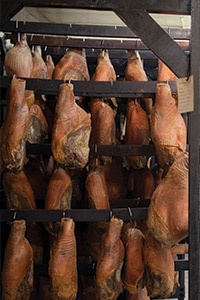
“I knew I couldn’t survive on what they were paying,” he remembers. “I thought about going to law school. Thank goodness I didn’t do that.”
Benton heard that, between Madisonville and Sweetwater, on Old Highway 68, a dairy farmer named Albert Hicks had decided to shut down his tiny ham-curing operation, where area farmers had brought their hogs since 1947.
“On the first of September 1973, he leased me that little frame building. He was a shrewd businessman and a great farmer. I cherish the time I spent with Albert Hicks. I learned a lot about life. I was wet behind the ears and green as the grass. I knew what we did with hams at home. I ran my business in his back yard for five years.”
Hicks had always had a problem with spoilage.
“He couldn’t figure it out,” says Benton. “When I came back with the food tech professors’ solution, Albert said, ‘He’s the luckiest dang boy I ever saw in my life.’
“The first time I visited the food tech professors, it was an epiphany. I wished that I could have started out on the ag campus. What I would give if I could have studied food technology. I swallowed hook, line and sinker everything they told me. “The first ham that had an unpleasant odor, I went in to the Food Tech Building, and within minutes Curtis Melton and Marjorie Penfield were assuring me what I needed to do to fix it. It was a combination of not quite enough salt and lengthening out the time and equalization.
If I hadn’t had the help they gave me,” he says, “I would never have survived.”
Around this time, Benton started dating Sharon Frerichs, a UT student. Their second date was to a pawn shop. “She likes to say, ‘Our dating went downhill from there,’” Benton says with a laugh.
They were married in 1974 at Vonore United Methodist Church. She graduated from UT in 1976 with a degree in education and for years supervised pre-K through eighth-grade curriculum and instruction for Monroe County. “I sure married over my head,” says Benton.
Love AT First Smell
In 1978, Benton built the cinderblock building on Highway 411 that he’s in today. His first break came about 10 years later. He talked with Kreis Beall, who was turning Blackberry Farm in Walland, Tennessee, into a five-star resort.
“Bob Carter was the chef,” says Benton. “It was the first white-tablecloth restaurant I was in. When Carter left, John Fleer set the pace for the culinary program out there. At one point, he called and said he’d been playing around with my product, and he wanted to develop a menu at Blackberry around our products and was wondering if it was OK to put my name on the menu. John started sharing my product with visiting chefs from all over the country. That’s when my phone started ringing off the hook.”
Then came a 2003 trip to a country-ham tasting in Oxford, Mississippi, hosted by the Southern Foodways Alliance, where Allan and Sharon Benton served their ham to hundreds of foodies, including many chefs, who were ecstatic.
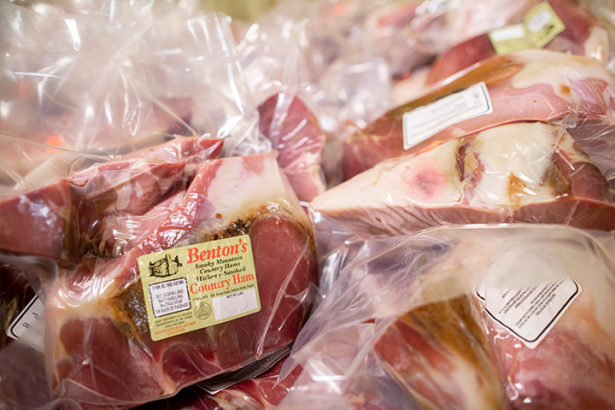
“All night long chefs kept coming up to me and asking me if I could sell them that product. I thought about it on my drive back to Madisonville. I realized I was selling 15-month-aged ham for the same price as 3-month-old hams. I was giving my product away. I decided to sell to fine dining restaurants. I changed my perspective. I had a team meeting of my three employees. I said we are going to increase production on aged hams—18- to 30-month hams—500 percent annually. It took a while to break into the market.”
In a memorable moment, Benton started selling to Tom Colicchio’s iconic New York City restaurant Craft. David Chang left Craft to start Momofuku Noodle Bar.
“Three days after he opened that first restaurant,” says Benton, “David was visiting Craft when he smelled my bacon frying. They say he stopped dead in his tracks, like a bird dog on point, and asked, ‘What is that aroma? What am I smelling?’ David told me it was love at first smell.”
Found in Five-Star Restaurants Near and Far
Just a handful of the iconic restaurants that feature Benton’s products are Luke and August in New Orleans, Thomas Keller’s The French Laundry in the Napa Valley, and Audrey and Husk in Nashville and Charleston, South Carolina.
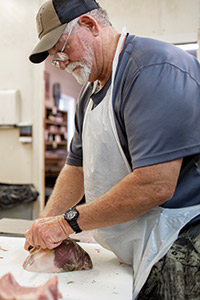
“I know my products are served in Europe,” says Benton, “more in France than anywhere else. Friends tell me they see my products on menus in Paris. I have deliberately chosen not to ship out of the country—the paperwork is too complicated. But chefs are determined people. If they want something, they find a way to get it. A chef in Hong Kong called me two or three times a year begging me to sell him my product.”
Still, says Benton, “I am more proud of restaurants in Nashville, Knoxville, Chattanooga and Memphis that I am of those in New York City because people in my home state know what good country ham is supposed to taste like. That’s the biggest compliment of all. Tomato Head in Knoxville was the first downtown restaurant that I ever sold to. I can’t tell you how proud I am that they use my product.”
When East Tennessee had slaughterhouses in the area, a hog would be butchered on Thursday, cut on Friday and delivered to Benton on Monday. But with the hogs coming from the Midwest, there’s a greater length of time between when the hog is slaughtered and when it is delivered.
“If I were 25 years younger,” says Benton, “I’d go and see every farmer I could find to see if we could get the money together to create a full-blown packing house in our area. There’s a need for it, and Knoxville is a natural location.”
Benton turns 75 in June.
“I’ve gone ahead and set a retirement date,” he says with a smile. “If I don’t change my mind, I’m going to retire when I’m 90.”
The Bentons’ three children are all in the medical field. Suzanne Benton is a psychiatrist in Raleigh, North Carolina. Darrell Benton is a radiologist with the Abercrombie Group in Knoxville. Elizabeth Benton, who earned her master’s as a family nurse practitioner in 2010 from UT Knoxville, is a nurse practitioner in Maryville.
“They want to cure anything but meat,” says Benton.
Among Allan and Sharon Benton’s five grandchildren, though, there is hope for succession:
“Emma Nicholson, 10, and William Benton, 7, have both said they want to grow up and run my farm and run my business.”
